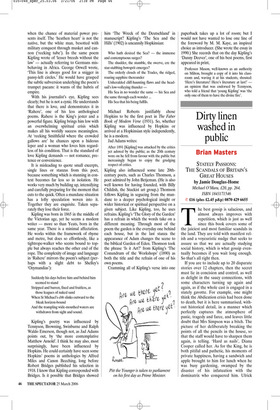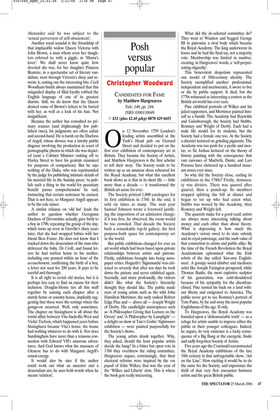Dirty linen washed in public
Brian Masters
STATELY PASSIONS: THE SCANDALS OF BRITAIN’S GREAT HOUSES by Jamie Douglas-Home Michael O’Mara, £20, pp. 264, ISBN 1843171546 ✆ £16 (plus £2.45 p&p) 0870 429 6655 The best gossip is salacious, and almost always improves with repetition, which is just as well since this book covers some of the juiciest and most familiar scandals in the land. They are told with manifest relish and a voyeuristic nudge that seeks to assure us that we are actually studying social history, which is what gossip eventually becomes if you wait long enough. So that’s all right then.
If you are to include up to 20 disparate stories over 12 chapters, then the secret must lie in concision and control, as well as delight in the saucy connections, with some characters turning up again and again, as if the whole cast is engaged in a stately gavotte. For example, one might think the Abdication crisis had been done to death, but it is here summarised, without historical detail, in a manner which perfectly captures the atmosphere of panic, tragedy and farce, and leaves little doubt that Mrs Simpson was a bitch. The picture of her deliberately breaking the points of all the pencils in the house, so that the staff would have to sharpen them again, is telling. ‘Hard as nails’, Diana Cooper called her. As for the King, he is both pitiful and pathetic, his moments of private happiness, having a sandwich and apple brought to him for lunch when he was busy gardening, swamped by the disaster of his infatuation with the dominatrix who conquered him. Ulrick Alexander said he was subject to the ‘sexual perversion of self-abasement’.
Another royal scandal is the friendship of that implacable widow Queen Victoria with John Brown, a man whom even her daughters referred to, with a giggle, as ‘Mama’s lover’. We shall never know quite how devoted she was, for her daughter Princess Beatrice, in a spectacular act of literary vandalism, went through Victoria’s diary and rewrote it, cutting out the interesting bits. Cecil Woodham-Smith always maintained that this misguided display of filial loyalty robbed the English language of one of its greatest diarists. Still, we do know that the Queen desired some of Brown’s letters to be buried with her, as well as a lock of his hair. Not insignificant.
Because the author has consulted no primary sources (and frighteningly few published ones), his judgments are often unfair and second-hand. He is harsh on the Duchess of Argyll, whose divorce was a tawdry public disgrace involving the production in court of pornographic photos in which she was depicted (and a Cabinet Minister rushing off to Harley Street to have his genitals examined for purposes of comparison). But he says nothing of the Duke, who was reprimanded by the judge for publishing intimate details of his married life in the Sunday press; ‘to publish such a thing to the world for pecuniary benefit passes comprehension’ he said, instructing that certain sentences be excised. That is not here, so Margaret Argyll appears to be the sole sinner.
A similar reliance on ‘old hat’ leads the author to question whether Georgiana Duchess of Devonshire actually gave birth to a boy in 1790, repeating the gossip of the day, which turns up even in Greville’s diary years later, that she had swapped babies with her friend Bess Foster. He does not know that I tracked down the descendant of the man who delivered the baby, Dr Croft, and found letters he had written home to his mother, including one penned within an hour of the accouchement, confirming the birth of a boy, a letter not seen for 200 years. It pays to be careful and thorough.
It is all right to revisit old stories, but it is perhaps less easy to find an excuse for their inclusion. Douglas-Home ties all this stuff together by naming each chapter after a stately home or country house, implicitly suggesting that these were the settings where the goings-on occurred. Well, only sometimes. The chapter on Sissinghurst is all about the torrid affair between Vita Sackville-West and Violet Trefusis, which happened years before Sissinghurst became Vita’s home; the house had nothing whatever to do with it. Nor does Sandringham have more than a tenuous connection with Edward VII’s amorous adventures. And God knows what the massacre of Glencoe has to do with Margaret Argyll’s sexual energy.
It would also be nice if the author could work out what an ancestor and a descendant are; he uses both words when he means ‘relation’.
























































 Previous page
Previous page